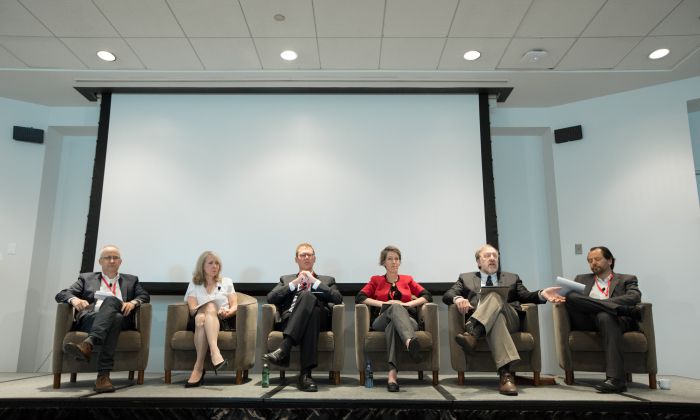After decades of approaching antitrust through purely economic analyses, are economists once again willing to take into account political considerations as well?
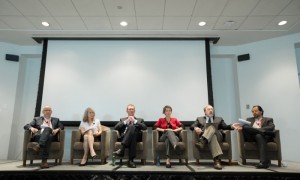
Should political considerations play a role in antitrust? In the last four decades, the predominant approach was that antitrust enforcement should only be guided by economic considerations such as efficiency and consumer welfare. Now, if a panel at the recent Stigler Center conference on concentration in America is any indication, it seems that some economists are once again willing to take into account the political dimensions of antitrust.
In 1979, former FTC chairman Robert Pitofsky published a seminal paper on what he termed the “political content” of antitrust. Contrary to the view that antitrust should be concerned exclusively with economic questions, Pitofsky argued that “political values” should be incorporated into the enforcement of antitrust laws.
Among those values, Pitofsky listed “the fear that excessive concentration of economic power will foster anti-democratic political pressures, the desire to reduce the range of private discretion by a few in order to enhance individual freedom, and the fear that increased governmental intrusion will become necessary if the economy is dominated by the few.” Ignoring those concerns, Pitofsky asserted, would be tantamount to ignoring “the bases of antitrust” and the “rough political consensus that has supported antitrust enforcement for almost a century.”
The notion that economic power can be politically dangerous has played an integral part in American political culture since the founding of the republic. While in Paris in 1787, Thomas Jefferson famously supported the inclusion of a “restriction against monopolies” in the Bill of Rights. Since then, the fear that concentration of economic power engenders political power has been taken up as a cause by many, most notably by Supreme Court Justice Louis Brandeis in the early 20th century. In the 1930s, University of Chicago economist Henry Simons discussed the anti-democratic nature of monopoly power. “Political liberty can survive only within an effectively competitive economic system,” he wrote. “Thus, the great enemy of democracy is monopoly, in all its forms.”
By the 1980s, political antimonopoly concerns had largely been pushed aside. In recent years, however, as concentration has risen across multiple American industries, voices calling for a “re-politicization” of antitrust have increased—both in numbers and in volume.
In his book Capitalism for the People (Basic Books, 2012), University of Chicago Booth School of Business professor Luigi Zingales [director of the Stigler Center and one of the editors of this blog] favors a possible reframing of antitrust policy away from a purely economic analysis, noting that the original motivation for the Sherman Act was “a popular revolt against the political corruption perpetrated by large corporations,” rather than an attempt to mitigate economic distortions. If antitrust analyses took into account the political influence businesses can acquire through market power, instead of just relying on a purely economic analysis of costs and benefits, he argued, “many mergers considered welfare-enhancing today would appear to be welfare-reducing instead. They would be stopped or subjected to restriction. For example, mergers that lead to excessively powerful political entities could be subject to limitations on the amount of lobbying they engage in. This would be a radical departure from the status quo.”
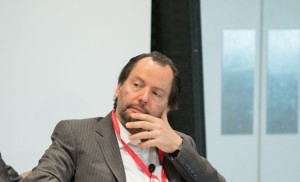
During the Stigler Center panel, which ended the center’s three-day conference, Zingales argued that “There is a direct connection between economic power, bigness, and political power.”
“The entire neoclassical economics agenda is to eliminate the word power from the discussion. The word power, however, was very much present in Adam Smith,” said Zingales.
Contrary to Armen Alchian’s and Harold Demsetz’s famous dictum that firms have no power beyond “ordinary market contracting between any two people,” Zingales argued that bigness grants firms enormous power. “In the U.S., my presumption is that bribes in cash are relatively rare, but there are many other ways for businesses to influence regulators and politicians, for instance by offering future jobs. The effectiveness in using these instruments is clearly related to how likely a firm is to be around in the future, how big its rents are. If you are a big corporation, allocating a little bit of those rents to somebody is worth the gain. But you can only have these rents to allocate if your firm is well entrenched.”
Apart from Zingales, the panel also featured Jonathan Baker, a Professor of Law at the American University Washington College of Law; Zephyr Teachout, an Associate Professor of Law at Fordham University and a former Democratic congressional candidate; Maurice Stucke, a law professor at the University of Tennessee and co-founder of the law firm The Konkurrenz Group; and Diana Moss, president of the American Antitrust Institute. The panel was moderated by Guy Rolnik, a Clinical Associate Professor at Chicago Booth and Co-Director of the Stigler Center [also, one of the editors of this blog].
Much of the debate was colored by concerns that antitrust under the Trump administration would be used as a weapon to promote political and economic interests. The panel began with a note of caution from Baker, who served as chief economist at the FCC (2009-2011) and as Director of the Bureau of Economics at the FTC (1995-1998), as well as a senior economist at the President’s Council of Economic Advisers and chief economist of the DOJ’s antitrust division.
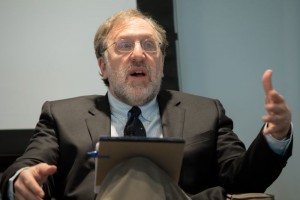
“We do need political action to protect and reform antitrust, but we should still keep enforcement decisions out of the realm of day-to-day politics,” said Baker. Prior to the 1970s, he said, antitrust was understood as advancing social and political goals, along with economic goals. But political concerns were addressed indirectly, through tougher merger enforcement. Then, in the 1980s, policy changed and antitrust rules were relaxed, under the assumption that “greater efficiencies would more than compensate for firms exercising market power.”
The bet “that greater business freedom to pursue efficiencies would lead to long-term consumer welfare gains without facilitating substantial and durable market power,” Baker noted, had failed. “From today’s vantage point, market power appears to have been widening for decades, while economic dynamism and the rate of economic productivity growth have been declining.”
But Baker was wary of endorsing a political dimension of antitrust. “The norm against direct political influence on enforcement decisions is important, like the norms against direct political influence on the resolution of cases in court. It discourages enforcement decisions that would indulge special interest protectionism or reflect regulatory capture. Direct political influence on antitrust decisions would most likely result in under-enforcement, would exacerbate the trend towards the exercise of market power, and make it more difficult to restore competitive markets and preserve the antitrust approach to supervising large firms.”
Instead, said Baker, “we now need to reform antitrust on economic grounds, to protect existing competition and create more competitive markets.” Political support for increased scrutiny of large firms “is critical to making progress,” he acknowledged. “Politics has an important role to play in generating the reforms and the resources that have allowed our antitrust institutions to address our market power problem, but those institutions cannot do so effectively unless politics continues to stay outside the room when enforcement decisions are made, and when cases are decided in court.”
Nevertheless, Baker added that “a regime that focuses purely on economic competition is not going to fully solve the problems of oligarchy, political power, and privacy, all these issues that are coming up and demand policy responses.”
The case for political antitrust
Teachout, author of Corruption in America: From Benjamin Franklin’s Snuff Box to Citizens United (Harvard University Press, 2014), advocated for a “re-politicized” version of antitrust that engages traditional antimonopoly values. “Should we, in general, consider that one of the key purposes of antitrust or antimonopoly laws is the preservation of a democratic self-governing society? The answer is yes,” she said.
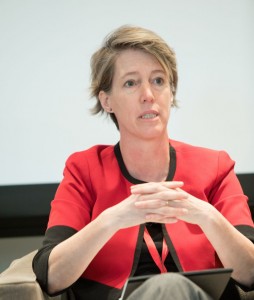
To illustrate what she called a “fundamental crisis of the rule of law vs. the rule of men,” Teachout used a personal anecdote: “My first political experience was working for Howard Dean’s campaign in 2003. I wrote his open-source policy. I took it to my policy director, and my policy director said, ‘I have a friend who has a friend who’s the public policy director of Microsoft, who we just met when we were out on a [fundraising] trip. Before we take this, we just need to check with them, see what they think about this.’”
“We’re talking probably about 35-50 thousand dollars that could have been raised by Microsoft employees from one policy or another. There was no need for that. It was just that open-source policy was not among the top three policies of my candidate. This is the sort of routine social way in which policies are made, by reference to Microsoft’s chief of public policy.”
This sort of influence, said Teachout, has led to a crisis of democracy. “That crisis is very felt. People do not believe that Apple, Amazon, and Google get the same treatment when it comes to tax policy or criminal law. They are not wrong in that belief. The too big to jail problem is as threatening, if not more, than the too big to fail problem that we have.”
The undermining of the rule of law due to monopolization, said Teachout, “is one of the reasons that actually led us to President Trump, who himself is threatening the rule of law in other ways. There’s a very dangerous dynamic between the lawlessness that comes with that, when you have monopoly powers leading to other forms of lawlessness.”
The capture of America’s political system by special interests cannot be addressed, argued Teachout, without engaging antimonopoly principles. “Citizens United is not about to be overturned. Merely moaning that the correct response would be to overturn Citizens United is a profound abdication of responsibility on the part of all of us to protect our democracy.”
Even prior to Citizens United, Teachout said, America’s political system was already moving in the direction of “oligarchy.” Congress, she said, has also abdicated “its own authority and power in this area.” She added: “The existing antitrust rules, even filled up with more appropriate principles, are not actually up to the task of dealing with the threat of oligarchy that we have in our society now.”
Moss, a former regulator, also defined antitrust as a political economy issue. “Market power begets political power, and political power influences policy outcomes,” she explained. As the best example of antitrust’s political economy nature, Moss cited inequality.
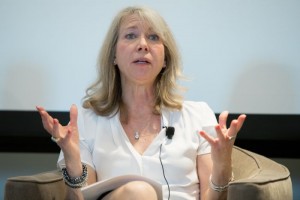
“Growth in income and wealth inequality is fundamentally an antitrust problem, because of the growth of dominant firms from what is a relatively lax period of enforcement,” said Moss. This rise in inequality has had major political repercussions, as voters who felt disenfranchised after being affected by globalization and job losses overwhelmingly supported Donald Trump.
“If Donald Trump was going to be true to his base, he would actually support vigorous antitrust enforcement to prevent the growth of dominant firms that have significant buying power in labor markets,” said Moss.
Contrary to repeated calls to increase regulation as a way to address competition problems, Moss argued that antitrust would be far more effective as a tool. “The call for more regulation to address declining competition raises a lot of sticky questions,” she said. “For example, where is the market failure that would justify invasive, ex-ante intervention in the markets to address competition problems, or declining competition? What form would regulation take? We’ve heard about public utility regulation—are we talking about regulating prices and profits, limits on entry, limits on the ability to integrate upstream and downstream, some form of open access? Who would be regulated? Digital platforms? How do we determine whether platforms would be regulated or not? What are the criteria?”
Antitrust, Moss added, “does not have the Achilles heel [of capture] as much as regulation does.” But the use of antitrust as a primary policy tool raises questions as well, particularly regarding remedies.
“Coming up with remedies for the antitrust agencies is absolutely a test of political will. Saying no to negotiating on a bad remedy, an ineffective remedy, takes significant political will in dealing with companies that have significant market power and political power,” said Moss.
Teachout, meanwhile, advocated for antitrust to go beyond the courts and for Congress to stop “abdicating” its responsibility. “The rulers or elected representatives are actually, I think, the heart of it. Congress needs tools. It needs us, not just to be saying, ‘Oh, well, look at the courts,’ but to be saying, ‘Here are tools from history.’ I think it’s an incredibly important point, that Congress should be the main field of battle.”
Political antitrust is becoming more important in the age of super platforms
Arguing in favor of incorporating political values into antitrust, Stucke (a former prosecutor at the U.S. Department of Justice) asserted that “there is really no doubt that antitrust has political content.” This political content of antitrust, Stucke argued, has become even more important with the rise of “super platforms” like Google, Facebook, Amazon, and Apple.

“How is a data-driven economy different from the old economy? One difference would be with the super-platforms, because they get so much data that flows through them, they have this nowcasting radar. They can see necessarily what are the emerging trends. Google can anticipate a flu well before the government. They could see, for example, where consumers are downloading, what types of products they are getting, and then they can move into those markets. We’re starting to see that with Amazon as well. They could see what their third-party vendors are selling, and then they can move into the markets as well. With this nowcasting radar, the data-driven monopoly today can be much more powerful than the monopolies of past.”
A price-focused approach, he added, is unlikely to be effective in the data-driven economy. “Search engines are free. They’re going to have a significant role in the news that we watch and the entertainment that we see. The ability to manipulate our emotions is going to be even more dramatic with the digital personal assistant. Where does that leave us? Political values are part of antitrust.”
Stucke added a caveat. “You can’t throw in political values and say, ‘Throw that in the hopper.’ Because what’s going to happen then is that our antitrust standards are going to deviate substantially from the ideals of the rule of law. I would agree that political values are important, but they have to be incorporated into our legal standards in ways that fulfill and further rule of law ideals.”
Moss also referenced the unique problems that digital platforms present to antitrust authorities. “There’s this idea that government is the only area where we could be regulated, but Google and Amazon are regulating us. They are our regulators in the deep, traditional understanding of regulation. They are telling us what are the ingredients that can be used in the key drugs that we are using. They are controlling and making non-democratic decisions outside of the democratic sphere.”
European competition authorities, Moss and Stucke agreed, are ahead of the U.S. when it comes to dealing with platforms. “We are seeing the increasing collision, or intersection, of privacy and consumer protection and competition policy, and the U.S. is way behind the eight ball on managing that,” said Moss.
Antitrust, cautioned Stucke, has an important role to play in dealing with network effects, but it can’t be the only tool: “The tools that we have under our old paradigm are not necessarily going to work in the new paradigm. If Google were to acquire Twitter, that’s not necessarily a horizontal merger. It’s not a conglomerate merger. It’s not a vertical merger. Yet because of the data, there might be significant competitive consequences as a result. The first thing we need to identify is what are the potential risks in a data-driven economy? Where do our tools work and don’t work? Some of the areas where our tools don’t work would be algorithmic collusion, where there’s tacit collusion. That’s problematic.”





